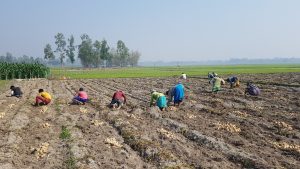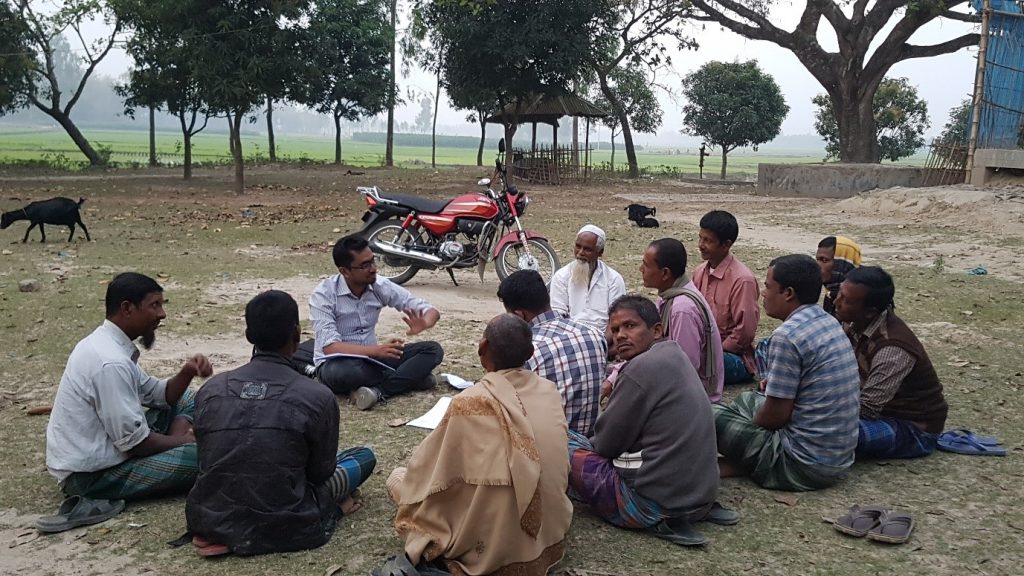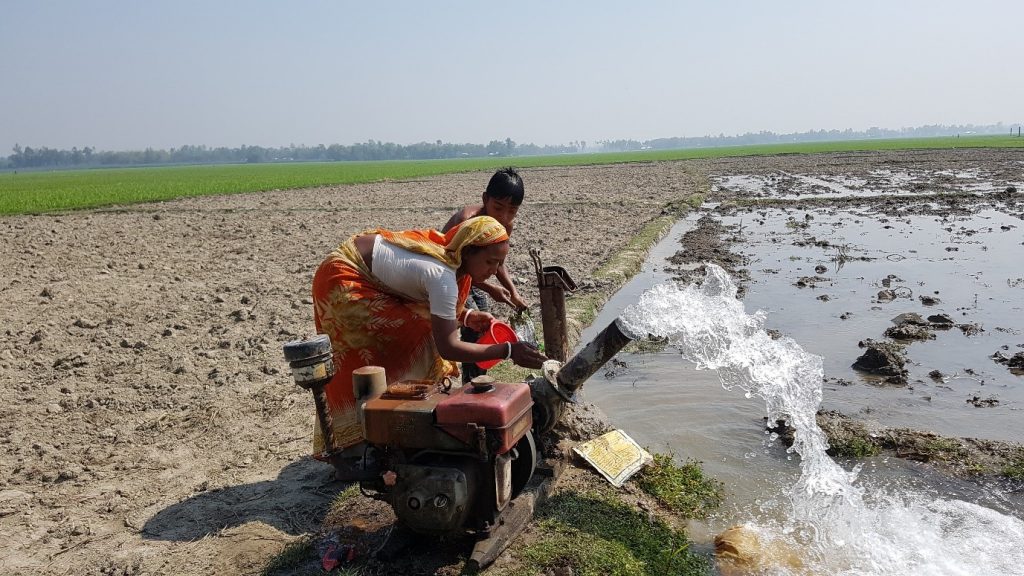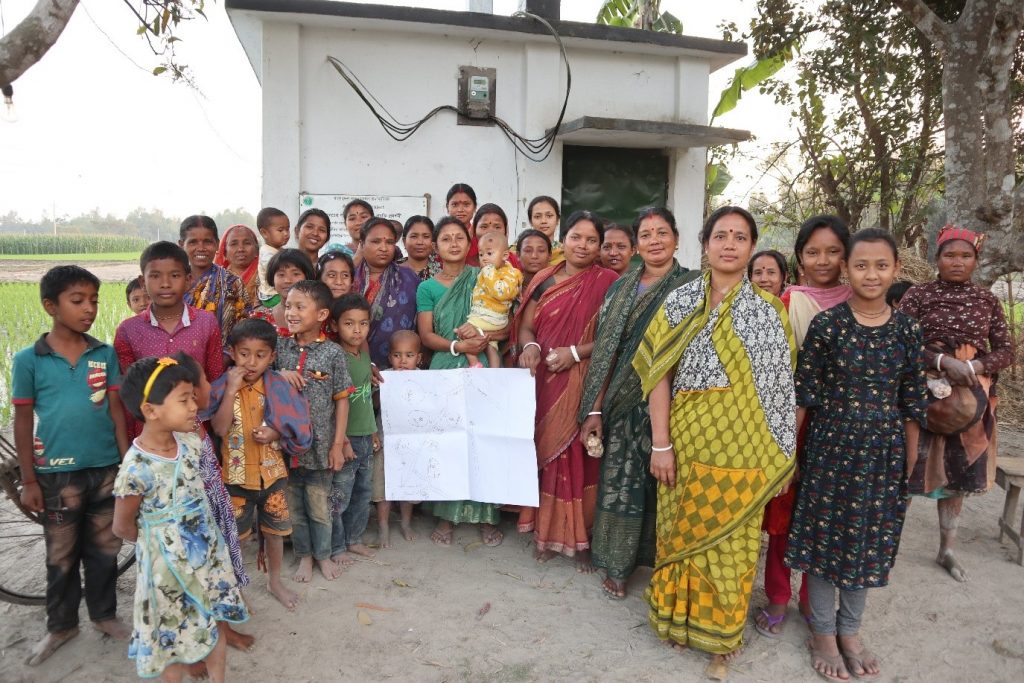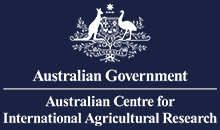It has been an exciting experience conducting research as part of the project DSI4MTF and writing my master thesis on ‘Gendered groundwater technology adoption in Bangladesh’ at the Swedish University of Agricultural Sciences in Uppsala, Sweden. I am grateful to the project partners BRRI and CSIRO for funding the local costs of my fieldwork during the research. Here, I share the experiences of my journey in quest of knowledge.
The fieldwork started with a relishing cold breeze in the morning in early March when I visited one of the DSI4MTF project sites, Dhandogaon village in Thakurgaon. The breeze went away and the scorching sun revealed itself, I found a significant number of the farmers are busy with harvesting the potato with a big smile on their faces. I could simply guess that the harvest was good for them this year. Through a discussion with my key informants and roaming around the village along with some other farmers, I have learned the characteristics of the irrigation system in the village and the different operation processes. After collecting the necessary data from Dhandogaon village, I moved to Ramnather Para village in the Rangpur District. The same process of data collection was conducted in this village as well.
Figure 1: Women and Men are harvesting potatoes in Dhandogaon village
My main objective of this research was to find out how the farmers experience different kinds of irrigation technologies, e.g. Deep Tube Well (DTW), Diesel-run Shallow Tube Well (D-STW) and Electric Shallow Tube Well (E-STW). It also focuses on the social relations in adopting different technologies.
I interviewed stakeholders from different social backgrounds including women/men, machine owners/renters, tenant farmers/landowners, Hindu/Muslim, etc. The intention was to include diverse types of people in the dataset. Along with individual interviews I also conducted Focus Group Discussions (FGD), and Community Wealth Rankings. Various methods of data collection enriched my data and helped me analyse it well.
Figure 2: The researcher, Sadiq Zafrullah, is conducting a focus group discussion with the farmers, Source: Author
According to the farmers, there are disparities in water extraction capacity, rental costs and time needed for irrigation among different machines. There is no fixed structure followed in deciding the rental costs. There are different types of contract between the machine owner and renter. However, for similar kind of machines the contracts are more or less similar in both the study sites. Such variation influences farmers’ experiences of these technologies and shapes the meanings assigned to the machines.
I asked a farmer if his female family members were involved in irrigation tasks, he replied no. But when I followed up asking when I met his wife doing the irrigation, he told me that she was just overseeing the work due to his absence. When asking the same question to another farmer, he also replied, “No, they do not come for irrigation. They are women”. Similar types of perspectives could also be found out in conversation with the farmers which clearly showed low recognition of women irrigators.
Figure 3: A woman in Dhandogaon village irrigating her land with STW, Source: Author
Differential access to the technologies affects the social relations among the farmers. The benefits and decision-making power are higher for machine owners than water renters. A farmer who rents water from an E-STW said, “It would be good if I had my own machine. Then I could get the water whenever I wanted. I do not need to wait for my serial”. In several cases, adoption and/or control of irrigation machines contributes to uneven benefits among the farmers that, in turn, strengthens social hierarchy. With E-STW, there is a machine operator who is in-charge of irrigating the lands of the renters. He maintains the queue and irrigates the lands in rotation. A farmer complained, “…those who get water from E-STW, they have to wait for the serial. By the time I would get the water, my land gets dry”. I also found that different social identities intersect each-other and creates discrimination and divergence of experience. As a result, interpretation of the technologies varies among different social groups.
To ensure the sustainability of the irrigation system, it is important to evaluate if the advanced technology would be sustainable to the agricultural system. It is because several farmers in both the study sites opined that the action of powerful machines has impact on the capability of other machines. Secondly, the latest technologies implemented should have a management system with regular monitoring and more participation from community members. Besides, the cultural norms have implication over women’s access to a machine according to different modes of operation. Thus, the design of a technology should consider the social aspects like the institutions that create barriers for people with certain social identities. If the technology can offer the convenience of operation and improve the accessibility within the social norms such as increased women’s access to technology, then the outcome of a technology might be the maximum. Lastly, the agricultural extension services (AES) need to be strengthened and address the issues of social inequality.
Figure 4: A few women and children in the village after a participatory resource mapping
The whole journey of writing this master thesis, starting from writing research proposal to the submission of the final version of the thesis, has been full of learning and gaining experiences. I would like to thank my supervisor Stephanie Leder for the continuous support. The advice and suggestions from DSI4MTF partners have been crucial in developing the thesis. Specially, I would like to thank Mohammed Mainuddin of CSIRO, Md Maniruzzaman and Mahbubul Alam from the Bangladesh Rice Research Institute (BRRI) for their contribution to my research work.
The master thesis can be downloaded here: https://stud.epsilon.slu.se/14576/1/zafrullah_s_190613.pdf
-Sadiq Zafrullah
MSc, Rural Development, Swedish University of Agricultural Sciences, Sweden
BSS, Economics, University of Dhaka, Bangladesh
sadiq.zafrullah@gmail.com




